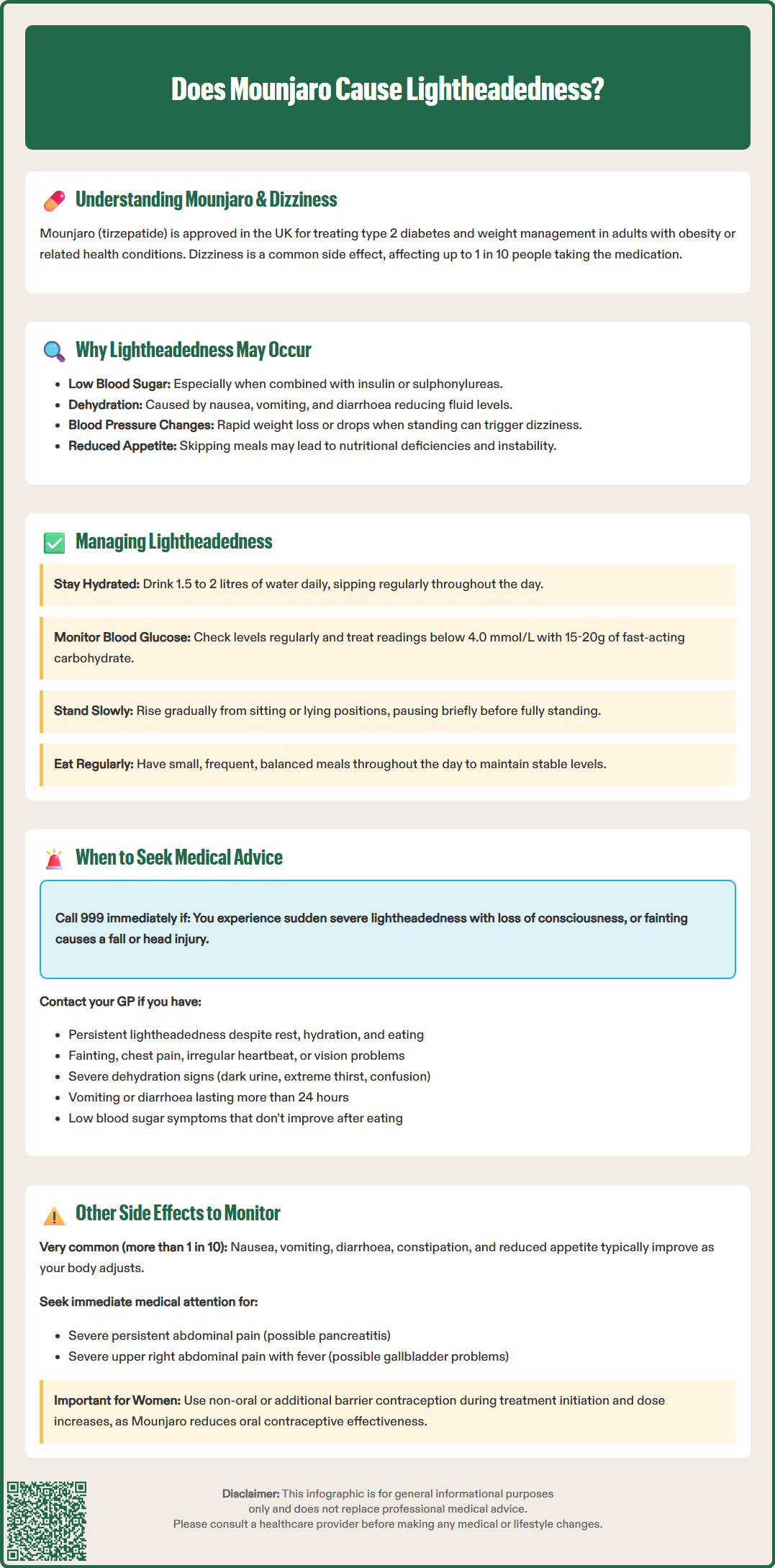
Mounjaro (tirzepatide) is a dual GIP and GLP-1 receptor agonist licensed in the UK for type 2 diabetes and weight management. Lightheadedness is a recognised side effect, with dizziness affecting up to 1 in 10 patients according to MHRA-approved prescribing information. This symptom may arise through several mechanisms, including hypoglycaemia when combined with certain diabetes medications, volume depletion from gastrointestinal side effects, or blood pressure changes. Understanding why lightheadedness occurs and when to seek medical advice ensures safe, effective treatment. This article examines the causes, management strategies, and warning signs requiring prompt clinical assessment.
Quick Answer: Mounjaro can cause lightheadedness, with dizziness affecting up to 1 in 10 patients as a common adverse reaction listed in MHRA-approved prescribing information.

Mounjaro® is the most innovative GLP-1 medication proven to dramatically curb appetite, hunger, and cravings to help professional men achieve substantial weight loss.
Start Here
Wegovy® is a weekly injectable GLP-1 medication with proven effectiveness in reducing appetite, hunger, and cravings to help busy professionals lose significant weight.
Start HereMounjaro (tirzepatide) is a prescription medicine licensed in the UK for the treatment of type 2 diabetes mellitus and, more recently, for weight management in adults with obesity or overweight with weight-related comorbidities (NICE TA906). According to the Medicines and Healthcare products Regulatory Agency (MHRA) approved Summary of Product Characteristics (SmPC), dizziness is listed as a common adverse reaction (affecting up to 1 in 10 people).
Lightheadedness or dizziness during Mounjaro treatment may occur through several mechanisms. These include potential hypoglycaemia (particularly when used with insulin or sulphonylureas), volume depletion, and blood pressure changes. The risk of orthostatic hypotension (blood pressure drop when standing) is specifically mentioned in the SmPC as a concern with tirzepatide therapy.
Clinical trial data for Mounjaro predominantly highlight gastrointestinal side effects (nausea, vomiting, diarrhoea) as the most frequently reported adverse reactions. However, dizziness remains a recognised side effect that should be monitored. If you experience persistent or severe lightheadedness whilst taking Mounjaro, it is essential to discuss this with your GP or diabetes specialist nurse to determine the underlying cause and ensure your treatment remains safe and effective.

Understanding the mechanism of action of Mounjaro helps explain why some patients may experience lightheadedness. Tirzepatide is a dual glucose-dependent insulinotropic polypeptide (GIP) and glucagon-like peptide-1 (GLP-1) receptor agonist. It works by enhancing insulin secretion in response to meals, suppressing glucagon release, slowing gastric emptying, and reducing appetite. These actions collectively improve glycaemic control and promote weight loss.
Hypoglycaemia (low blood sugar) is a potential contributor to lightheadedness, particularly in patients taking Mounjaro alongside other glucose-lowering medications such as sulphonylureas or insulin. Whilst tirzepatide alone carries a low intrinsic risk of hypoglycaemia due to its glucose-dependent mechanism, combination therapy increases this risk. Symptoms of hypoglycaemia include dizziness, sweating, confusion, and tremor.
Volume depletion and dehydration are important factors specifically highlighted in the SmPC. The gastrointestinal side effects of Mounjaro—especially nausea, vomiting, and diarrhoea—can lead to significant fluid loss. Prolonged vomiting or diarrhoea may cause volume depletion, orthostatic hypotension (dizziness upon standing), and potentially acute kidney injury. This risk may be higher in older adults and those taking diuretics or antihypertensive medications.
Additionally, rapid weight loss may contribute to changes in blood pressure, which can produce dizziness. Patients who experience substantial appetite suppression should ensure they maintain adequate hydration and nutritional intake through small, frequent meals, even when feeling less hungry.
Whilst mild, occasional lightheadedness may resolve spontaneously or with simple measures, certain red flag symptoms warrant prompt medical attention. You should contact your GP or call NHS 111 if you experience:
Persistent or worsening lightheadedness that does not improve with rest, hydration, or food intake
Fainting or near-fainting episodes (syncope or pre-syncope)
Chest pain, palpitations, or irregular heartbeat accompanying the dizziness
Severe headache, visual disturbances, or slurred speech
Signs of severe dehydration: reduced urine output, dark urine, extreme thirst, dry mouth, or confusion
Symptoms of hypoglycaemia that do not resolve after consuming fast-acting carbohydrates
Inability to keep fluids down for more than 8 hours or ongoing vomiting/diarrhoea for more than 24 hours
If you experience sudden, severe lightheadedness with loss of consciousness, this constitutes a medical emergency—call 999 or attend your nearest Accident & Emergency department immediately. If syncope causes a fall or head injury, urgent medical assessment is required.
For patients with pre-existing cardiovascular conditions, autonomic neuropathy, or those taking multiple medications affecting blood pressure, it is particularly important to report new or worsening dizziness. Your healthcare provider may need to review your medication regimen, check your blood pressure in different positions (lying, sitting, standing), assess your blood glucose control, and evaluate your hydration status. Do not stop taking Mounjaro without medical advice, as abrupt discontinuation may affect your diabetes management or weight loss progress.
Several practical strategies can help minimise lightheadedness whilst taking Mounjaro. Firstly, ensure adequate hydration throughout the day. Aim for at least 1.5 to 2 litres of water daily (unless you have heart failure or kidney disease requiring fluid restriction—discuss individualised targets with your healthcare provider). Increase fluid intake if you experience vomiting or diarrhoea. Sipping fluids regularly rather than consuming large volumes at once may be better tolerated if you feel nauseated.
Monitor your blood glucose levels as recommended by your diabetes care team, particularly if you take other glucose-lowering medications. If you experience symptoms suggestive of hypoglycaemia (dizziness, sweating, shakiness), check your blood glucose if possible. If it is below 4.0 mmol/L, consume 15-20g of fast-acting carbohydrate (e.g., glucose tablets, small glass of fruit juice), wait 10-15 minutes, then recheck your levels, as per NHS guidance. Your doctor may need to adjust doses of concurrent diabetes medications.
Rise slowly from sitting or lying positions to allow your cardiovascular system time to adjust. This is particularly important first thing in the morning or after prolonged rest. Sit on the edge of the bed for a moment before standing, and hold onto stable furniture if needed.
Maintain regular, balanced meals even if your appetite is reduced. Eating small, frequent, bland meals rather than skipping meals entirely helps maintain stable blood glucose and blood pressure. Discuss any dietary modifications, including salt intake, with your healthcare provider, particularly if you have hypertension, heart failure, or kidney disease.
If lightheadedness persists despite these measures, your GP may consider dose adjustment or temporarily pausing Mounjaro whilst investigating the underlying cause. Follow 'sick day rules' if you cannot keep fluids down—contact your healthcare provider promptly. Never adjust your dose independently without medical guidance.
Beyond lightheadedness, Mounjaro is associated with a range of adverse effects, predominantly affecting the gastrointestinal system. According to MHRA-approved prescribing information, the most common side effects include:
Nausea and vomiting (very common, affecting more than 1 in 10 people)—often most pronounced during dose escalation
Diarrhoea or constipation (very common)
Abdominal pain or discomfort (common)
Reduced appetite (very common)
Dizziness (common, affecting up to 1 in 10 people)
These gastrointestinal symptoms typically improve over time as your body adjusts to the medication. Staying well-hydrated and consuming small, frequent meals can help manage these effects.
Injection site reactions (redness, itching, swelling) occur commonly but are usually mild and self-limiting. Rotate injection sites weekly between the abdomen, thigh, and upper arm to minimise local reactions.
Important warnings from the SmPC include:
Risk of hypoglycaemia when used with insulin or sulphonylureas—dose adjustments of these medications may be needed
Volume depletion and acute kidney injury risk with severe gastrointestinal symptoms
Reduced exposure to oral contraceptives during initiation and dose increases—consider using non-oral or additional barrier contraception
More serious but less common adverse effects include pancreatitis (inflammation of the pancreas). Seek immediate medical attention if you develop severe, persistent abdominal pain that may radiate to your back, accompanied by nausea and vomiting.
Gallbladder problems, including gallstones (cholelithiasis) and cholecystitis, have been reported with GLP-1 receptor agonists and are associated with weight loss. Symptoms include severe upper right abdominal pain, fever, and jaundice.
Diabetic retinopathy complications may occur in patients with pre-existing diabetic eye disease, particularly with rapid improvement in glycaemic control. Regular eye screening as per NICE guidelines for diabetes care remains essential.
Report suspected side effects to the MHRA through the Yellow Card Scheme (yellowcard.mhra.gov.uk), which allows patients and healthcare professionals to contribute to ongoing medication safety monitoring.
Dizziness is a common side effect of Mounjaro, affecting up to 1 in 10 people according to MHRA-approved prescribing information. It may occur through hypoglycaemia, volume depletion, or blood pressure changes.
Contact your GP or NHS 111 if you experience persistent or worsening lightheadedness, fainting episodes, chest pain, severe dehydration signs, or hypoglycaemia symptoms that do not resolve. Call 999 for sudden severe dizziness with loss of consciousness.
Maintain adequate hydration (1.5–2 litres daily unless restricted), monitor blood glucose levels, rise slowly from sitting or lying positions, and eat regular balanced meals. Discuss persistent symptoms with your healthcare provider for possible dose adjustment.
All medical content on this blog is created based on reputable, evidence-based sources and reviewed regularly for accuracy and relevance. While we strive to keep content up to date with the latest research and clinical guidelines, it is intended for general informational purposes only.
DisclaimerThis content is not a substitute for professional medical advice, diagnosis, or treatment. Always consult a qualified healthcare professional with any medical questions or concerns. Use of the information is at your own risk, and we are not responsible for any consequences resulting from its use.